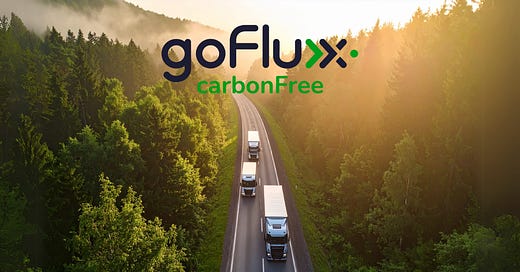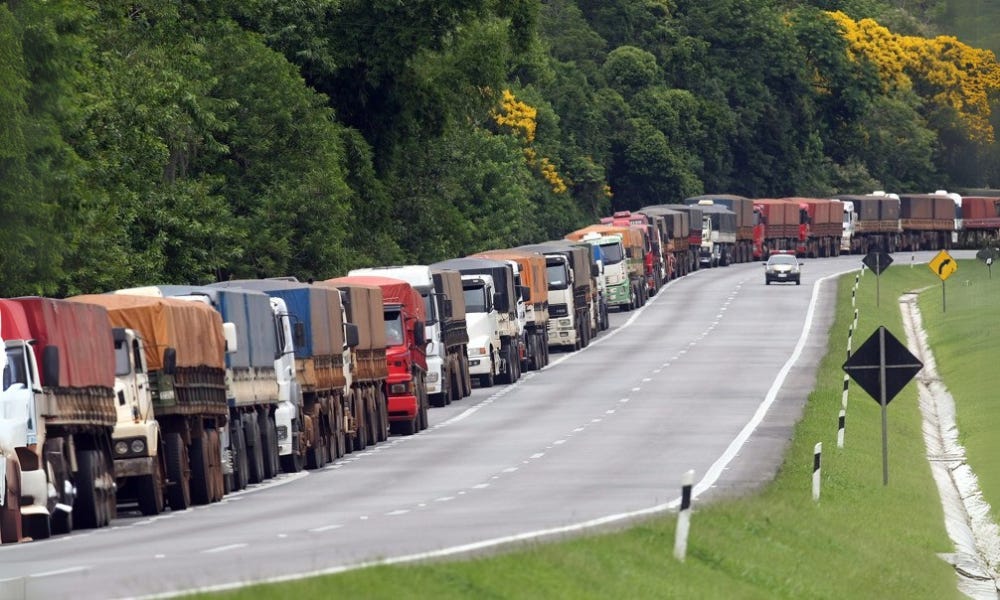🚛 Fixing the Freight: How goFlux is cleaning up Brazil’s Ag logistics with Quotes, Credit, and Compliance
#4 BAR Stars
The smart logistics platform that’s making Brazil’s ag freight faster, fairer, and fully accountable.
A Clear Road Ahead
For all its global dominance in soy, corn, meat and coffee, Brazil’s ag economy still runs on a fragile, analog foundation: trucks. Lots of them. More than 60% of the country’s agricultural cargo moves by road. And yet, for decades, freight contracting remained one of the most inefficient and opaque corners of the value chain. Most shippers got just one or two quotes. Many relied on legacy brokers, backdoor deals, or favors. Governance was weak. Visibility, almost nonexistent. For input suppliers, cooperatives, and trading companies moving billions in ag products, the system wasn’t just clunky — it was broken from the inside out.
That’s the problem goFlux set out to fix.
From quotes to compliance: Rewiring the system
Founded in São Paulo in 2017, goFlux built a digital freight marketplace that’s redefining how Brazilian agribusiness moves cargo — and how it tracks cost, emissions, and accountability. At its core, the platform connects shippers (trading companies, input distributors, co-ops) with thousands of approved transporters, enabling real-time quoting, negotiation, and digital contracting.
But this isn’t just a better spreadsheet. It’s a radical shift in visibility and governance.
On the platform, every freight quote is documented. Every deal is recorded. Every player — from the Cargills of the world to small rural carriers — has access to the same data and terms. There’s no space for favoritism or kickbacks. It’s transparent, auditable, and deeply integrated with ESG and compliance frameworks. In a sector where “freight” was often a blind spot, goFlux has made it measurable — and, increasingly, manageable.
And that visibility unlocks something bigger: trust.
With more than US$5 billion in Gross Freight Value processed since 2018 and 150 million+ tons of cargo moved, goFlux is proving that better governance isn’t just ethical — it’s efficient. Customers aren’t just finding better prices. They’re gaining full control over their logistics strategy, complete with emissions metrics, performance data, and automated reporting.
From Diesel to Decarbonization
Where goFlux really breaks new ground is in sustainability. The team developed Brazil’s first CO₂ emissions calculator for medium- and long-haul trucking, creating the foundation for their flagship product: goFlux carbonFree.
Here’s how it works: As freight is quoted and tracked, the platform automatically calculates CO₂ emissions by route, cargo type, and fuel usage. Verified credits — including forest-based offsets from the Cerrado and renewable energy projects — can be purchased and retired directly in the system. All of it is traceable. All of it is auditable. All of it happens inside the same freight workflow.
In 2024 alone, over 1.5MM tons of CO₂e were offset through goFlux carbonFree. One ag input client has already neutralized more than 6,000 tons of emissions over two years of partnership — setting a new benchmark for climate leadership in logistics. And now, goFlux is expanding into multimodal tracking (road, river, rail), green insurance, and emissions control for ag machinery transport.
Where Freight Meets Fintech
While goFlux began by cleaning up freight procurement, its fintech layer is quietly solving one of the sector’s most persistent pain points: working capital. Most small and midsize transporters — the backbone of Brazil’s ag logistics — operate on razor-thin margins and can’t afford to wait 30, 60, or 90 days to get paid. Fuel, maintenance, and fleet upgrades don’t wait. Neither can they.
To close this gap, goFlux created a dedicated working capital solution, backed by a structured credit fund (FIDC), to provide fast, flexible financing to carriers. Instead of waiting weeks or months to get paid, transporters on the platform can access early payment — unlocking the cash they need to fuel trucks, maintain fleets, and take on more loads. For shippers, that means more reliable freight. For transporters, it’s a financial lifeline built into the workflow.
But credit is just one piece of the puzzle. goFlux also provides financial visibility to shippers with tools like the IGFF (Índice goFlux de Frete) — Brazil’s most robust freight index — and custom dashboards for cost forecasting and emissions tracking. The data isn’t just for internal use: it's available via Bloomberg Terminals, offering institutional players a new lens on ag logistics costs and trends.
goFlux may look like a freight marketplace on the surface, but under the hood, it’s a fintech infrastructure layer — designed to move not just cargo, but capital.
The Minds Behind the Marketplace
goFlux’s leadership team combines deep expertise in logistics, finance, and digital infrastructure — with a shared drive to bring transparency and trust to one of Brazil’s most fragmented markets.
Rodrigo Gonçalves (CEO & Co-founder) is a logistics veteran and serial operator who thrives where complexity meets execution. He founded goFlux to tackle the inefficiencies he saw firsthand in Brazil’s fragmented freight system — and has since grown it into a national platform trusted by ag giants, financial institutions, and sustainability leaders alike.
Luís Martinez (Chief Strategy Officer) brings deep expertise in innovation, B2B marketplaces, and corporate supply chains. At goFlux, he’s responsible for steering long-term strategy, including the company’s evolution from a quoting tool into a data-rich, climate-smart infrastructure platform.
Pedro Azevedo (Chief Financial Officer) ensures financial rigor behind every transaction. With a background in corporate finance and risk, he built the internal systems that power goFlux’s freight flows — from payment infrastructure to credit analytics — and is leading the expansion of their fintech stack and working capital solutions.
Renato Castilho (Chief Technology Officer) leads the engineering team behind goFlux’s digital core. With a background in enterprise systems and cybersecurity, he has scaled the platform to support real-time freight, emissions, and finance data — all while maintaining ISO 27001 certification and high availability across thousands of users.
Together, they’re not just building a company — they’re reengineering the operating system for ag freight in Brazil.
The Rails Beneath the System
In Brazil, freight has always been a wildcard — a source of cost inflation, delays, and opacity in an otherwise modernizing ag value chain. But that’s changing.
goFlux is proving that logistics doesn’t have to be a black box. It can be efficient. It can be fair. It can be climate-positive. And for investors looking at Brazil’s agriculture story, this isn’t just a logistics play — it’s a systems play. One that weaves together infrastructure, data, decarbonization, and finance into a single, scalable platform.
Fixing freight might not sound glamorous. But it may be one of the most critical upgrades in Brazil’s ag transition. And goFlux is laying the rails.
Thanks for reading.
KFG 🚀
Kieran Finbar Gartlan is an Irish native with over 30 years experience living and working in Brazil. He is Managing Partner at The Yield Lab Latam, a leading venture capital firm investing in Agrifood and Climate Tech startups in Latin America.
All views, opinions, and commentary expressed are strictly his own.










